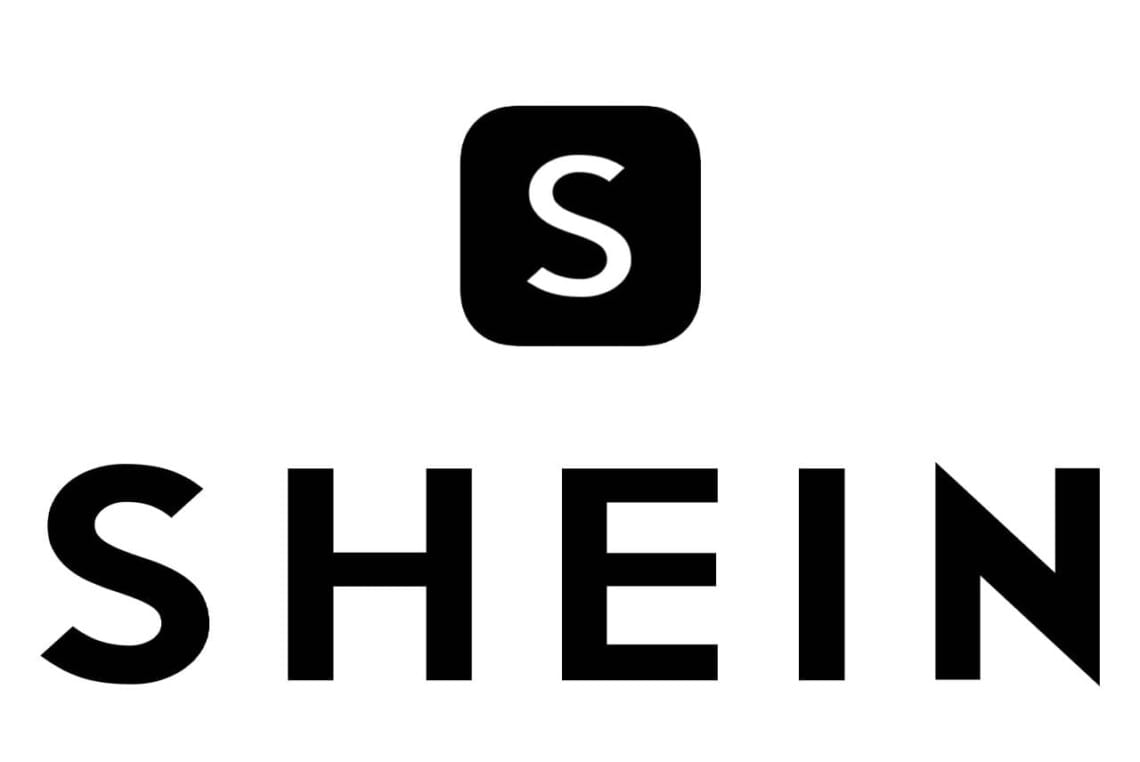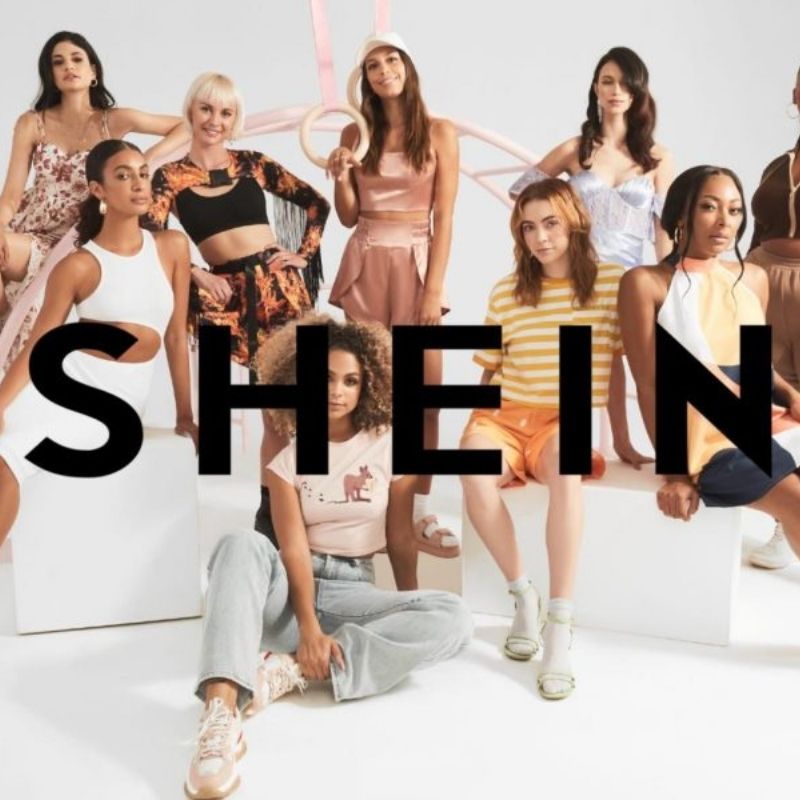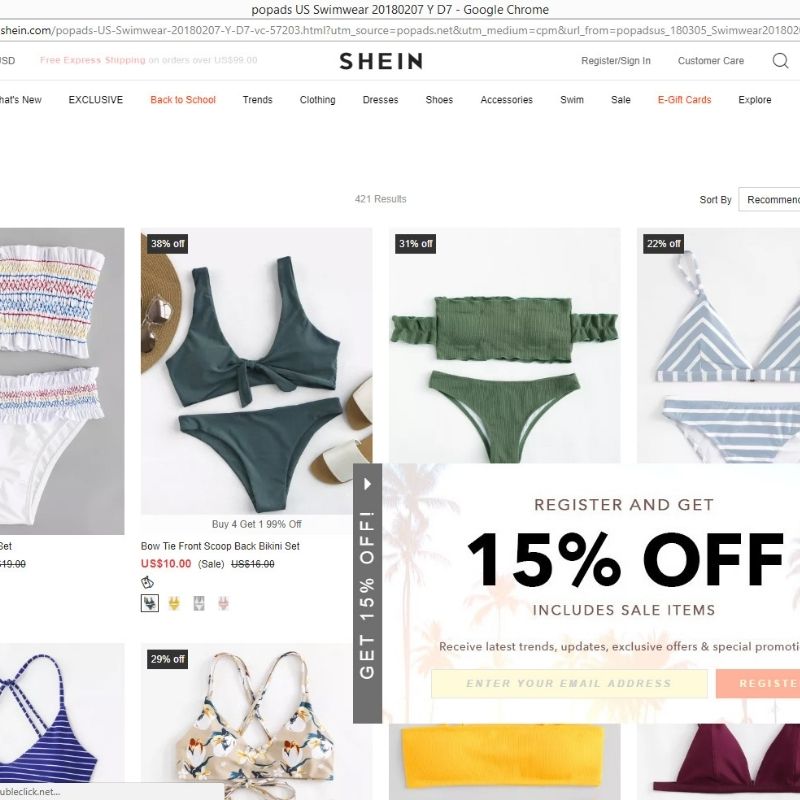
SHEIN
SHEIN is an international e-commerce company of fast fashion b2c, founded by Chinese entrepreneur Chris Xu in 2012
The company is mainly specialized in women’s ready to wear fashion, but it also offers men’s lines, children’s lines, accessories, shoes, bags and other fashion items.
SHEIN is mainly addressed to Europe, United States, Australia and the Middle East, but also to other consumer markets.
The brand was founded with the philosophy that “everyone can enjoy the beauty of fashion”. Its business covers more than 150 Countries all over the world.

The debut
The Shein online retail store was originally called ZZKKO. Shein was founded in 2008 in Nanjing, China, by Xu Yangtian, an expert in search engine optimization at a marketing company. Initially, the company’s first activity involved the exclusive sale of wedding dresses. Then, Shein expanded towards the sale of female clothing in general and the name was changed into “Sheinside”.
The company acquired its items from the Guangzhou wholesale clothing market, a central hub for many of China’s clothing manufacturers and markets. Shein had no involvement in the design or production of the garments. However, it worked similar to a drop shipping company, which sells items directly to international customers via third-party wholesalers.
Strategic changes
Shein made its products available in Spain, France, Russia, Italy and Germany in the early 2010s, as well as selling cosmetics, shoes, bags, jewelry, and women’s clothing.
In 2012 the company started using social media marketing collaborating with fashion bloggers for free gifts and advertising adds on Facebook, Instagram and Pinterest. In 2013 the company had 100 employees and had its headquarters in Guangzhou, in China.
Two years later, to become a fully integrated retailer, Shein started developing its own supply chain system. In the same year it acquired Romwe, another Chinese e-commerce. The company name changed again in 2015, from “Sheinside” to “Shein” stating that it needed a name that was more intuitive and easier to find online.
By 2016, Xu put together a team of 800 designers and prototypes producing Shein-branded clothing. The company began to improve its supply chain by excluding suppliers who provided low-quality articles or photos.
Shein today
In November 2021, Shein went from a company valued at $ 15 billion to one valued at $ 30 billion. During the 2020 pandemic, according to what was referred, it made $ 10 billion in revenue, making it the seventh consecutive year of more than 100% sales growth for the company. In October 2020, Shein was the largest online-only fashion company in the world.
SHEIN now ships to over 150 countries and territories around the world. The website is available for the United States, Spain, France, Russia, Germany, Italy, Australia and the Middle East. The warehouses containing the packages to be shipped, on the other hand, are located in various strategic points.
Shein conquers Generation Z
Shein ranks first in the Apple Store shopping categories in 56 countries. In the US, since mid February it has been the shopping app second only to Amazon and, according to a survey conducted by the Piper Sandler bank, it seems that it is also the second most popular e-commerce in the world, surpassing Amazon, but also Zara and the other low cost brands. Moreover, Shein was the most talked about brand on TikTok in 2020.
On Instagram and Tik Tok, Shein is very popular in the conversation with the new generations, namely that of the Millennials and Generation Z, also thanks to the recent Shein X 100K Challenge program.
The company announced that “its expansion through the SHEIN X incubator program offers emerging designers the opportunity to design their collections under Shein’s cover, assisting them 360 degrees throughout the manufacturing process, from sampling to communication “.
The SHEIN X 100K CHALLENGE, launched by the low-cost brand is an initiative which involves a challenge between different designers to win 100,000 dollars and be present on the home page of the site, in the section in the foreground dedicated to Shein’s Fall Winter 2021 fashion.

Influencer Marketing
The Chinese platform boasts collaborations with more or less famous influencers all over the world. In Italy, according to a report by Buzzoole, Shein was the most brand in 2020 influencer marketing campaigns. Moreover, the retailer’s early use of TikTok and the ability to advertise viral articles have increased Shein’s popularity.
To get an idea of the type of collaboration that the shop has with influencers, let’s take the partnership with Addison Rae as an example, a young TikTok star with a profile of over 77 million followers. The e-commerce provides a discount code to most of the influencers with whom it collaborates, so as to be able to acquire more and more customers due to the discounts offered and to retain users who have had the opportunity to live a shopping experience.
The discount coupon provided by the influencers is the strong point of Shein’s campaign, combined with the choice of influencers who are followed by an ideal target audience for the platform itself. This mode seems to be adopted by Shein also in all the other influencer marketing campaigns.
The success thanks to social media
On Instagram, TikTok and YouTube the hashtag #sheingals, meaning Shein girls, the young buyers who take pictures and videos of their purchases, became popular. They call the purchases “haul”, and they involve their followers with the discount codes.
The brand has studied a points program that rewards not only those who buy, but above all those who buy and share on social media: 1 point for every dollar spent, 10 for a comment, 20 if you put a picture with your purchase. Each time you reach 100 points you have one dollar discount, but the points have a short duration and have to be used before they expire. On the website, in fact, there are always timed offers, with a timer that marking them.

Shein and the controversy in the United Kingdom
In August 2021 the Chinese company was accused of failing to provide official information relating to the conditions of workers in its factories. According to press sources, the Chinese e-commerce company did not give news about its supply chain, required by law in the UK.
The page dedicated to the company’s social responsibility denies it resorts to child or forced labour, although it does not provide clear information on the matter.
In fact, the international news agency Reuters has investigated the truth behind the official statements available on the social responsibility page on the company’s website, which claims to have good work conditions and not to have to deal with slave or child labour. However, according to a study by Reuters, this information may not be true.
Lack of transparent information
When it was contacted by the local reporter Victoria Waldersee, the brand declined to disclose its annual revenue in several countries.
Brands with revenues over £ 36 million are legally required to present clear information on working conditions in factories. Analysts have estimated that Shein’s turnover amounts to at least £ 5 billion a year, with a market value of around £ 15 billion.
In Great Britain, companies beyond a certain size are required to visibly declare the steps they are taking to combat forced labour as part of the country’s 2015 Modern Slavery Act.
The same law requires, in fact, that companies of this caliber must provide a statement on an accessible and visible link on its home page.
Analysts estimate Shein’s turnover is around £ 5 billion a year, with an estimated market value of £ 15 billion. The main rivals of the brand, such as H&M, Asos, Boohoo and Zara, instead, publish reports with various transparency data. In the case of H&M and Inditex, this data even includes specific addresses and names of the factories the brands use.
Moreover, the brand is often accused of plagiarism by several small creatives and designers. In the most recent case, designer Bailey Prado accused the Chinese retailer of copying more than 40 of her crochet dresses. Following the accusation, the brand removed 10 of these pieces and kept the rest for sale.
READ ALSO:

Slowear

